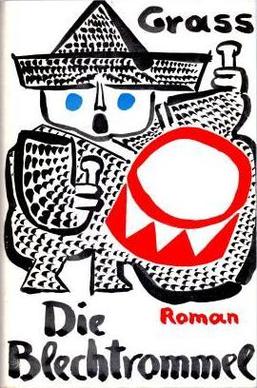The Tin Drum facts for kids

Cover of the first German edition
|
|
| Author | Günter Grass |
|---|---|
| Original title | Die Blechtrommel |
| Translator | Ralph Manheim, Breon Mitchell |
| Cover artist | Günter Grass |
| Country | West Germany |
| Language | German |
| Series | Danzig Trilogy |
| Genre | Magic realism |
| Publisher | Hermann Luchterhand Verlag |
|
Publication date
|
1959 |
|
Published in English
|
1961 |
| Pages | 576 |
| OCLC | 3618781 |
| 833.914 | |
| Followed by | Cat and Mouse |
The Tin Drum (German: Die Blechtrommel) is a 1959 novel by Günter Grass, the first book of his Danzig Trilogy. It was adapted into a 1979 film, which won both the 1979 Palme d'Or and the Academy Award for Best Foreign Language Film in 1980.
To "beat a tin drum" means to create a disturbance in order to bring attention to a cause.
Contents
Characters
The novel is divided into three books. The main characters in each book are:
Book One
- Oskar Matzerath: Writes his memoirs from 1952 to 1954, age 28 to 30, appearing as a zeitgeist throughout historic milestones. He is the novel's main protagonist and unreliable narrator.
- Bruno Munsterberg: Oskar's keeper, who watches him through a peep hole. He makes knot sculptures inspired by Oskar's stories.
- Anna Koljaiczek Bronski: Oskar's grandmother, conceives Oscar's mother in 1899, which is when his memoir begins.
- Joseph Koljaiczek ("Bang Bang Jop" or "Joe Colchic"): Oskar's grandfather, a "firebug".
- Agnes Koljaiczek: Kashubian Oskar's mother.
- Jan Bronski: Agnes's cousin and lover. Oskar's presumptive father. Politically sided with the Poles.
- Alfred Matzerath: Agnes's husband. Oskar's other presumptive father. Politically sided with the Nazi Party.
- Sigismund Markus: A Jewish businessman in Danzig who owns the toy store where Oskar gets his tin drums. The store is ruined during the Danzig Kristallnacht.
Book Two
- Maria Truczinski: Girl hired by Alfred to help run his store after Agnes dies. She remains Oskar's family throughout the post-war years.
- Bebra: Runs the theatrical troupe of dwarfs which Oskar joins to escape Danzig. He is later the paraplegic owner of Oskar's record company. Oskar's lifelong mentor and role model. He is a musical clown.
- Roswitha Raguna: Bebra's mistress, then Oskar's. She is a beautiful Italian lady, but taller than Oskar, she has nevertheless chosen not to grow. She is the most celebrated somnambulist in all parts of Italy.
- "The Dusters": Danzig street urchins gang, Oskar leads as "Jesus" after he proves his mettle by smashing all the windows with his voice at the abandoned Baltic Chocolate Factory.
Book Three
- Sister Dorothea: A nurse from Düsseldorf and Oskar's love after Maria rejects him.
- Egon Münzer (Klepp): Oskar's friend. Self-proclaimed communist and jazz flautist.
- Gottfried Vittlar: Becomes friends with and then testifies against Oskar in the Ring Finger Case at Oskar's bidding.
Style
Oskar Matzerath is an unreliable narrator, as his sanity, or insanity, never becomes clear. He tells the tale in first person, though he occasionally diverts to third person, sometimes within the same sentence. As an unreliable narrator, he may contradict himself within his autobiography, as with his varying accounts of, but not exclusively, the Defense of the Polish Post Office, his grandfather Koljaiczek's fate, his paternal status over Kurt, Maria's son, and many others.
The novel is strongly political in nature, although it goes beyond a political novel in the writing's stylistic plurality. There are elements of allegory, myth and legend, placing it in the genre of magic realism.
The Tin Drum has religious overtones, both Jewish and Christian. Oskar holds conversations with both Jesus and Satan throughout the book. His gang members call him "Jesus", and he refers to himself as "Satan" later in the book.
Translations
A translation into English by Ralph Manheim was published in 1961. A new 50th anniversary translation into English by Breon Mitchell was published in 2009.
Adaptations
Film
In 1979 a film adaptation appeared by Volker Schlöndorff. It covers only Books One and Two, concluding at the end of the war. It shared the 1979 Cannes Film Festival Palme d'Or with Apocalypse Now. It also won the Oscar for Best Foreign Language Film of 1979 at the 1980 Academy Awards.
Radio
In 1996 a radio dramatisation starring Phil Daniels was broadcast by BBC Radio 4. Adapted by Mike Walker, it won the British Writers Guild award for best dramatisation.
Theatre
The Kneehigh Theatre company performed an adaption of the novel in 2017 at the Everyman Theatre located in Liverpool. The production features the story from Oskar's birth through the war, ending with Oskar marrying Maria.
See also
 In Spanish: El tambor de hojalata (novela) para niños
In Spanish: El tambor de hojalata (novela) para niños
- Best German Novels of the Twentieth Century

